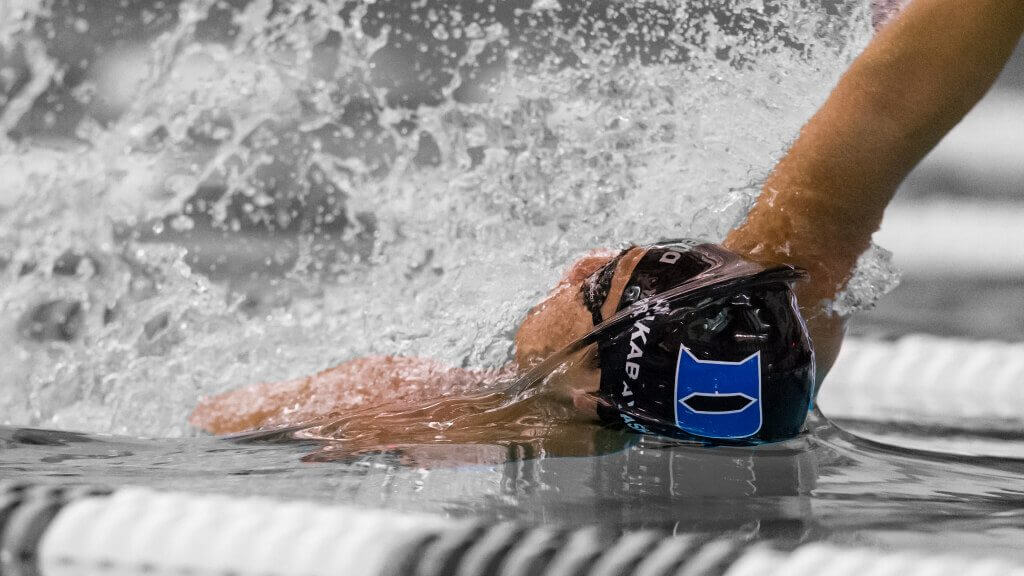Morning Splash: Program-Changing Dual Meet Win for Duke Blue Devils

By David Rieder.
Separated by just ten miles of U.S. Highway 15-501, Duke and North Carolina have developed one of the best rivalries in college athletics. Men’s basketball gets most of the attention, but the competition encompasses almost all sports. Except, that is, swimming and diving, where the matchups between the two schools have been notably one-sided.
The two teams compete annually in dual meets, but Duke’s men’s team came into this season on a 78-year losing streak against North Carolina—yes, the last Duke win had come in 1939—and the Blue Devil women had never beaten the Tar Heels.
Both of those streaks ended Saturday in Chapel Hill. Duke’s men dominated en route to a 173-126 win, and while the women’s meet was more competitive, with UNC’s Hellen Moffitt leading her team back from a big early deficit, Duke came out on top by a final score of 163-137.
No, Duke-UNC was not the dual meet with the most national resonance this weekend. That would have been the meet going on a half-hour’s drive east in Raleigh, where NC State’s women won a nail-biter against the nine-time defending ACC champion Virginia Cavaliers.
But as far as historical significance and the course of one program, Duke’s win is momentous.
For purposes of full disclosure, I graduated from Duke in May 2016. During my four years in school there, I was the venue announcer for the Duke swim team, and I was on deck at the Duke-UNC dual meet each of the last four years, including the home meets I announced in 2014 and 2016.
Each of those first three years, I was watching lopsided beat downs. That culminated in Jan. 2015, when the Tar Heel women won 175-113 while the men walloped Duke, 176-90.
Verity Abel was a freshman that season, and she remembers that uninspiring trip to Koury Natatorium all too well.
“It’s not that we took it as a joke, but there was no shot we were going to win it, so there wasn’t really any heart in any of the racing,” she recalled.
But one year later, the thought process had changed. The Blue Devils entered the meet believing they had a chance to compete, and it showed early on. Duke won both 200 medley relays before Abel finished first in the women’s 1000 free and teammate Matt Johnson did the same in the men’s 1000.
The Tar Heel women managed to pull away after that, but the Duke men held tough until the penultimate event. But finally, in the 400 IM, UNC’s Eugene Tee edged out Duke’s Michael Miller to put the meet out of reach.
The Blue Devils had again been beaten in their home pool, but the seed was planted that perhaps this competition could become a real rivalry, especially with North Carolina set to graduate an outstanding senior class. So from day one of the 2016-2017 season, Duke set out to beat UNC.
“We really had this goal since day one of the season, and it was something that we’d been talking about since we started setting our goals back in August and September,” Abel said. “The closer that we’ve gotten to the meet, and the more we’ve seen the results in the meets that we’ve had and their results as well, we realized it wasn’t, as [Duke head coach] Dan Colella put it, just a pipe dream. It really was a possibility.”
Very quickly, it became something far more realistic. Duke swept the 200 medley relays to open the meet, with the women beating the Tar Heels by more than a second-and-a-half and the men finishing first and second. In the next event, Abel won the 1000 free in 9:56.56, and teammate Brittany Kampfer edged out UNC’s Macey Arnold for second. Lindsay Schlichte picked up fourth-place points for Duke in that event as well.
From there, the Blue Devils would never relinquish the lead for either the women or the men. When they reached the 400 free relays, the Duke men had already wrapped up the win, and the women needed only to finish the race legally in order to clinch.
Duke’s Alyssa Marsh ended up coming from behind to pass UNC anchor Caroline Baldwin and win the women’s relay, 3:21.31 to 3:21.67, while Abel anchored the “B” relay to a third-place finish. The Duke men then came out on top in the final relay to end the meet.
“When we finished the 400 free relay, half of us were sobbing, especially the seniors—I think it couldn’t have been a more memorable last dual meet of their collegiate careers, to go out winning a meet that we’d never won in history,” Abel said.
“Four years ago, when we recruited these seniors, we talked about being a team that could contend in the ACC and beat the likes of a UNC,” Colella said. “There were a number of people that really closed incredibly well to put their hand on the wall before a Tar Heel, and that’s what it’s all about. We just couldn’t be more excited.”
From here, the season continues for Duke, and plenty of goals remain on the table for the ACC and NCAA championships over the next two months. But whatever happens from here, the season has already been immensely successful, if only for the impact of that one dual meet win.
“That was sort of an emotional bond that I don’t think any of us have ever experienced together,” Abel said. “It will be something that I remember forever.”
Aside from the enormity of the moment for this year’s team, the Blue Devils proved Saturday that, yes, Duke vs. North Carolina in swimming is actually a rivalry. The two schools’ proximity to each other—not to mention their use of contrasting shades of blue—make such an arrangement logical, but to be considered true rivals, each team must beat the other occasionally. At least more often than once every 80 years.
Duke, finally, stole a meet—two, in fact—on the opponent’s home turf. One year from now, you can bet that the Tar Heels will want to return the favor when the series returns to Durham.
When that meet comes around and for plenty of seasons after that, North Carolina will know full well that Duke has become legitimate, worthy competition—exactly the recognition Colella wanted to create for his program.
All commentaries are the opinion of the author and do not necessarily reflect the views of Swimming World Magazine nor its staff.




